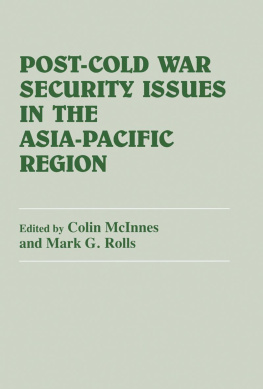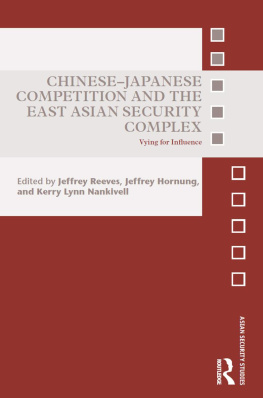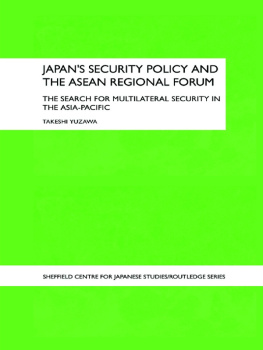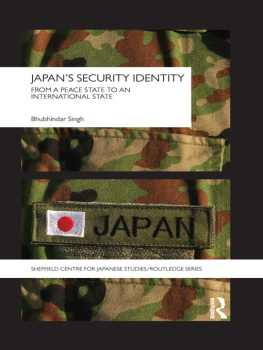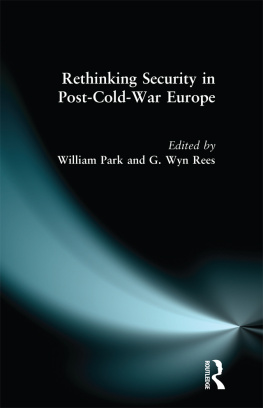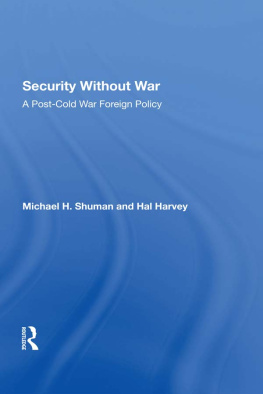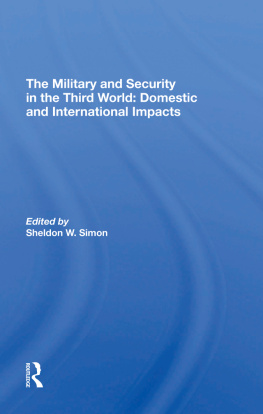East Asian Security in the Post-Cold War Era
East Asian Security in the Post-Cold War Era
Sheldon W. Simon, Editor
Paul H.B. Godwin
Paul Marantz
Edward A. Olsen
Robert A. Scalapino
William T. Tow
William S. Turley
Donald E. Weatherbee
Donald S. Zagoria
First published 1993 by M.E. Sharpe
Published 2015 by Routledge
2 Park Square, Milton Park, Abingdon, Oxon OX14 4RN
711 Third Avenue, New York, NY 10017, USA
Routledge is an imprint of the Taylor & Francis Group, an informa business
Copyright 1993 Taylor & Francis. All rights reserved.
No part of this book may be reprinted or reproduced or utilised in any form or by any electronic, mechanical, or other means, now known or hereafter invented, including photocopying and recording, or in any information storage or retrieval system, without permission in writing from the publishers.
Notices
No responsibility is assumed by the publisher for any injury and/or damage to persons or property as a matter of products liability, negligence or otherwise, or from any use of operation of any methods, products, instructions or ideas contained in the material herein.
Practitioners and researchers must always rely on their own experience and knowledge in evaluating and using any information, methods, compounds, or experiments described herein. In using such information or methods they should be mindful of their own safety and the safety of others, including parties for whom they have a professional responsibility.
Product or corporate names may be trademarks or registered trademarks, and are used only for identification and explanation without intent to infringe.
Library of Congress Cataloging-in-Publication Data
East Asian security in the postCold War era / edited by Sheldon W. Simon.
p. cm.
Based on papers from a March 1991 conference held at the
Monterey Institute of International Studies.
Includes bibliographical references and index.
ISBN 1-56324-058-0 (cloth). ISBN 1-56324-238-9 (pbk.)
1. East AsiaNational securityCongresses.
I. Simon, Sheldon W., 1937.
UA832.5.E37 1993
355'.03'095dc20
92-43961
CIP
ISBN 13: 9781563242380 (pbk)
ISBN 13: 9781563240584 (hbk)
Contents
Sheldon W. Simon |
Sheldon W. Simon |
Paul Marantz |
Donald S. Zagoria |
William T. Tow |
Edward A. Olsen |
Chinas Asian Policy in the 1990s: Adjusting to the
PostCold War Environment
Paul H.B. Godwin |
Robert A. Scalapino |
More Friends, Fewer Enemies: Vietnams Policy toward
Indochina-ASEAN Reconciliation
William S. Turley |
Donald E. Weatherbee |
PAUL H.B. GODWIN is professor of international affairs at the National War College, Washington, D.C., where he specializes in Chinese security policy. He has written extensively on the Chinese military and, in 1987, was a visiting professor at the Chinese People's Liberation Army National Defense University in Beijing.
PAUL MARANTZ is associate professor of political science at the University of British Columbia. He is the author or editor of three books on Soviet and Middle Eastern politics and a specialist in both Soviet foreign policy and foreign policy theory. Professor Marantz has been a National Fellow at the Hoover Institution.
EDWARD A. OLSEN is professor of national security affaire and Asian studies at the Naval Postgraduate School in Monterey. He is the author or editor of eleven books and monographs and numerous scholarly and newspaper articles on East Asian security with a particular emphasis on Japan and Korea. He began his career as an East Asia specialist in the U.S. Department of State.
ROBERT A. SCALAPINO is Robson Research Professor of Government Emeritus and former director of the Institute of East Asian Studies at the University of California, Berkeley. Frequently known as the "Dean of East Asian politics" in the United States, he is also an editor of Asian Survey, perhaps the best known scholarly monthly journal on Asian affairs. Author of countless books and articles, Professor Scalapino is equally well known on both sides of the Pacific.
SHELDON W. SIMON is professor of political science at Arizona State University. In 1991 he held the Gordon Paul Smith Visiting Chair at the Monterey Institute of International Studies. A specialist on Asian security, Professor Simon is author or editor of six books and seventy scholarly articles and book chapters, a member of the Advisory Board of The Asia Society, and a vice-president of the International Studies Association.
WILLIAM T. TOW is senior lecturer at the University of Queensland, Australia, and a specialist on East Asian security as well as NATO. He has written extensively on military issues in both areas of the world. In 1991 three of his books were published: one on NATO, one dealing with regional security organizations, and the third on extended deterrence in Asia.
WILLIAM S. TURLEY is professor of political science at Southern Illinois University, Carbondale. One of America's leading analysts on Vietnam, Professor Turley has published widely on both domestic and foreign affairs of that country as well as on its army and communist party. He has held visiting posts in both Thailand and Singapore.
DONALD E. WEATHERBEE is the Donald E. Russell Professor of Contemporary Foreign Policy at the University of South Carolina and a well-known specialist on both the domestic and international politics of Southeast Asia. A frequent visitor to the region, he has held visiting posts in several of the ASEAN countries. A member of the editorial board of several journals on Asian affairs as well as a member of both the Pacific Forum and Asia Society Councils, he publishes extensively on Southeast Asia in both scholarly journals and his own books.
DONALD S. ZAGORIA is professor of political science at Hunter College and a research professor at both the Graduate College of the City University of New York and Columbia University. One of the country's best known scholars on Sino-Soviet affairs, Professor Zagoria also writes extensively on the international politics of the Asian region. He is a member of numerous editorial boards of scholarly journals and is on the boards of the Council of Foreign Relations and the Asia Society, among other foreign policy organizations.
This volume emerged from a March 1991 conference cosponsored by the International Policy Studies Division of the Monterey Institute of International Studies and the Academic Research Support Program of the Defense Intelligence College. The Monterey gathering brought together some of North America's leading academic specialists on East Asian international politics and asked them to examine the region's future security prospects in light of the Cold War's end. Among the issues addressed in East Asian Security in the PostCold War Era are changes in Asian alignments of the postWorld War II period attendant upon the removal of the Cold War overlay from the region; the growing prominence of important regional actors less dependent on great power mentors; opportunities for the great powers to establish new relations with yesterday's adversaries; and finally, prospects for the peaceful resolution of such Cold War legacies as the division of Korea, Japan's territorial dispute with the former Soviet Union, tensions between the ASEAN states and Indochina, and China's new security posture as it balances the need for foreign investment with more traditional great power aspirations in East Asia. All of the chapters were rewritten in 1992 to take into account the Soviet Union's demise, movement toward a new modus vivendi in Korea as well as the future of nuclear weapons on the peninsula, the prospect of peace in Cambodia, and rapprochement between Indochina and ASEAN.





